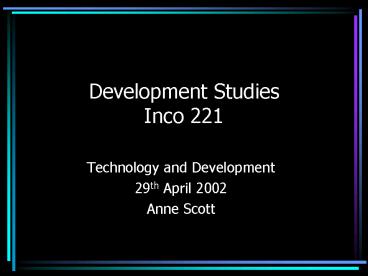Development Studies Inco 221 - PowerPoint PPT Presentation
1 / 20
Title:
Development Studies Inco 221
Description:
Civilization is the final end, the telos, towards which wild' nature is destined. ... (Quote on websites of Monsanto Co and the NZ Life Sciences Network) ... – PowerPoint PPT presentation
Number of Views:53
Avg rating:3.0/5.0
Title: Development Studies Inco 221
1
Development StudiesInco 221
- Technology and Development
- 29th April 2002
- Anne Scott
2
Some contested terms
- Progress
- Modernisation
- Diffusionism
- Development
- Objectivity
- Technology
3
Civilization is the final end, the telos, towards
which wild nature is destined. The progressive
narrative undoes the declension of the Fall
- Civilization is thus nature natured ordered
and tamed. - Carolyn Merchant (1996) Earthcare p.44
4
Responsible biotechnology is not the enemy.
Starvation is.
- Jimmy Carter former U.S. Pres. (Quote on
websites of Monsanto Co and the NZ Life Sciences
Network)
5
I asked myself why are Maori the last and least
to benefit, and first to suffer, from new
technologies?
- Bevan Tipene-Matua (2000) A Maori response to
the biogenetic age, in Prebble (ed.) Designer
Genes. Dark Horse.
6
An impact constituencya social group which
has not played any part in the design process of
a technology which has impacts on its members
daily lives
- J. Staudenmaier (1985) Technologys Storytellers.
MIT P. 198-9. - also see Rip, et al. (1995 5) Managing
Technology in Society.
7
The diffusionist narrative critiqued
- The European Miracle
- Voyages of Discovery
- Diffusion of objective knowledges
- Technological transfer
- Developmentby Sandra Harding (1998) Is Science
Multicultural?
8
How can technological change contribute to just
and sustainable development?
- Terry Grunwald argues (1997) The key issue is
not the technology and what it can do, but the
needs of communities, and how the technology can
be used strategically to meet those needs.
9
Objects are not technologies
- Technologies enhance human capabilities.
- They are defined by their functions.
- But no object functions all by itself!
- Economic physical infrastructure
- Organisational infrastructure
- Understanding and knowledge
- Cultural context and meaning
10
A definition of technologyS. Evert (1998)
Gender and Technology. Zed pp.5-6.
- Technologies are total packages of Human-made
artefacts/ processes and their social contexts
that are geared towards enhancing human
capabilities.
11
Questions for new technologies
Saskia Everts (1998) Gender
Technology
- Whose problem does this technology solve?
- What benefits does it provide, and for whom?
- What costs? Costs to whom?
- Expected impacts on culture / economy?
- Factors of appropriateness
- How to identify/address unexpected impacts?
- Effects on social power relations?
12
What about unintended impacts?
- Power relations
- Microtechnology or macrotechnology?
- Who controls the intellectual property?
- Who controls market access?
- Possible effects
- On linked activities
- On patterns of social relations
- On cultural cohesiveness and self-determination
13
Technology as an iterative process
14
David Hesss model
- Technologies of Destruction
- Extractive tech
- Tech of settlement and colonisation
- Tech of domination and surveillance
- Technologies of Resistance
- Technologies of Infrastructure
- Indigenous media
- Technologies of guerilla warfare
15
The European miracle was based on intensive
colonial extraction
- Slaves in a 16th C. Hispaniola Mine.from Hugh
Thomas (1997) The Slave Trade. Picador.
16
Close relationship of colonialism and the
Scientific Revolution
- Greenwich Observatory, by R. Thacker and F. Place
Lisa Jardine (1999) Ingenious Pursuits. Little,
Brown Co.
17
The creation of intellectual property
Diffusion as a two-way process
- Cocoa leaf, brought back from Jamaica by the
naturalist Hans Sloane, and developed into the
chocolate industry.Lisa Jardine (1999)
Ingenious Pursuits. Little, Brown Co.
18
All knowledges are local knowledges
- The point is to make situated knowledges possible
in order to be able to make consequential claims
about the world and on each other.Donna
Haraway (1997) Modest Witness. P.267.
19
Western scientific development was accompanied by
de-development of indigenous knowledge systems
- Movements of capital 1875-1914 Eric Hobsbawm
(1987) The Age of Empire. p.335.
20
more often Western science and technology are
tools in the ongoing process of the destruction
of indigenous land and culture.
- David Hess (1995) Science and Technology in a
Multicultural World. P.211.































